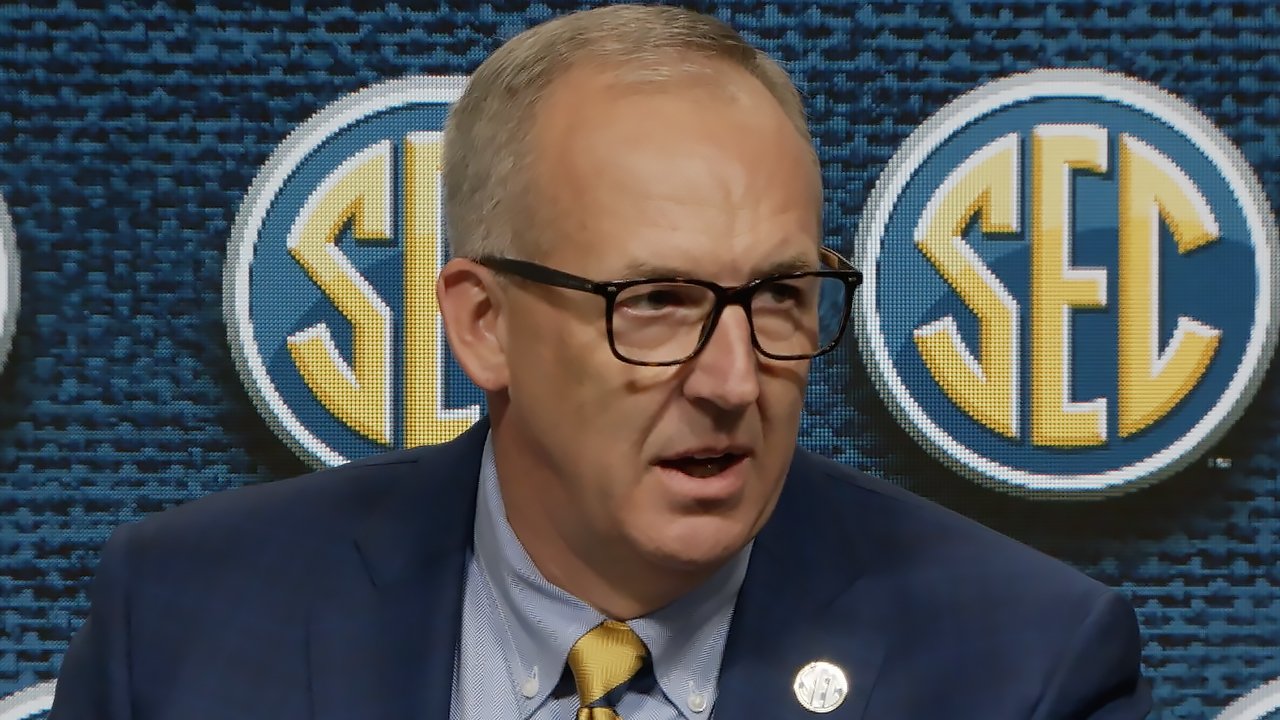MIRAMAR BEACH, Fla. — As college football landscape braces for seismic changes, SEC commissioner Greg Sankey didn’t tip-toe in.
He opened the league’s annual spring meetings with a blend of confidence and pointed commentary.
Sankey re-ignited debates over College Football Playoff (CFP) expansion, strength of schedule and the SEC’s place atop the sport’s hierarchy.
If nothing else, he intends on them staying there with the Big Ten.
Sankey’s Selective Memory and the Playoff Debate
Sankey, known for his steadfast advocacy of the SEC’s interests, addressed the media ahead of pivotal discussions with the league’s 16 member schools.
At the center of the conversation is the future format of the CFP. While the 2025 playoff will feature 12 teams, expansion to 14 or 16 remains on the table, with the selection process and automatic qualifiers under scrutiny.
Sankey’s remarks reflected his ongoing frustration with how last season’s playoff field was chosen.
“It’s clear that not losing becomes in many ways more important than beating the University of Georgia, which two of our teams that were left out did,” Sankey said, referencing Alabama and Ole Miss.
Both defeated Georgia but were excluded from the playoff in favor of teams with fewer losses.
He argued that strength of schedule should weigh more heavily in the selection process, suggesting the committee overlooked the SEC’s rigorous slate.
However, critics point out that while strength of schedule is vital, winning remains paramount.
Alabama and Ole Miss, despite marquee victories, suffered losses to teams with poor records, undermining their playoff cases.
“Alabama finished ranked ahead of a two-loss Big 12 champion, as well as a two-loss Miami team. Why?” one analyst said. “Because of that strength of schedule metric the committee allegedly doesn’t use.”
A Power Struggle Over Playoff Structure
Sankey’s comments come amid a broader power struggle between the SEC, the Big Ten, and other conferences.
The SEC and Big Ten recently secured the lion’s share of CFP revenue in a new deal with ESPN, intensifying scrutiny and fueling debate over playoff access and automatic bids.
“In our own room, I’ve had athletic directors tell me directly that we’ve given too much away to arrive at these political compromises,” Sankey said, referencing the contentious negotiations over playoff structure.
He remains open to ideas, but isn’t getting a lot of suggestions.
“My phone’s not ringing off the hook,” he said. “So we’ll continue to be thoughtful. We’ll continue to try to provide perspective and information to our members and help them guide the decision.”
Sankey’s tone at the meetings was described as “the most frustrated” some reporters had seen, signaling the SEC’s readiness to draw a line in the sand over playoff access and seeding.
The league is wary of a system that could allow lower-ranked teams from other conferences to displace SEC programs, as happened with Alabama last year.
Strength of Schedule: The SEC’s Rallying Cry
Throughout his tenure, Sankey has championed the SEC’s demanding schedules.
He cited Georgia as an example, arguing that a three-loss SEC team could still be among the nation’s best given the conference’s depth.
“At 9-3, they could be a top four or five team,” Sankey said. “The question is how will people examine those numbers vs. another team that could be 11-1 and 10-2?
“I’ve raised that issue. I do think we’ve benefitted from strength of schedule.”
Sankey acknowledged, however, that not all SEC schedules are created equal, especially after the addition of Texas and Oklahoma and the move to a single-division format.
“When we put the new format together with single division, I would look at somebody’s schedule and say ‘Wow, that’s a really tough schedule,’” he said. “Then look at somebody else’s and say ‘That’s a really, really difficult schedule by comparison.’ We’ve earned respect over time and a lot of football to be played.”
Defending the League and the Game
Sankey remains defensive about the SEC’s reputation and the criticism that comes with its dominance.
“I don’t lecture others about good of the game and coordinating press releases about good of the game,” he said, taking a subtle shot at other commissioners. “You can issue your press statement, but I’m actually looking for ideas to move us forward.”
He also defended the controversial decision to include Alabama over undefeated Florida State in last year’s playoff, emphasizing the committee’s difficult task.
“Some of the statements made in the immediacy of selection were disappointing to me as a colleague,” he said. “I would maintain the strength of our league — sure we lost some games — but as I look at what were the four best teams, I would maintain that we had two of those four.
“But again, the selection committee makes that decision, and we respect the decision.”








